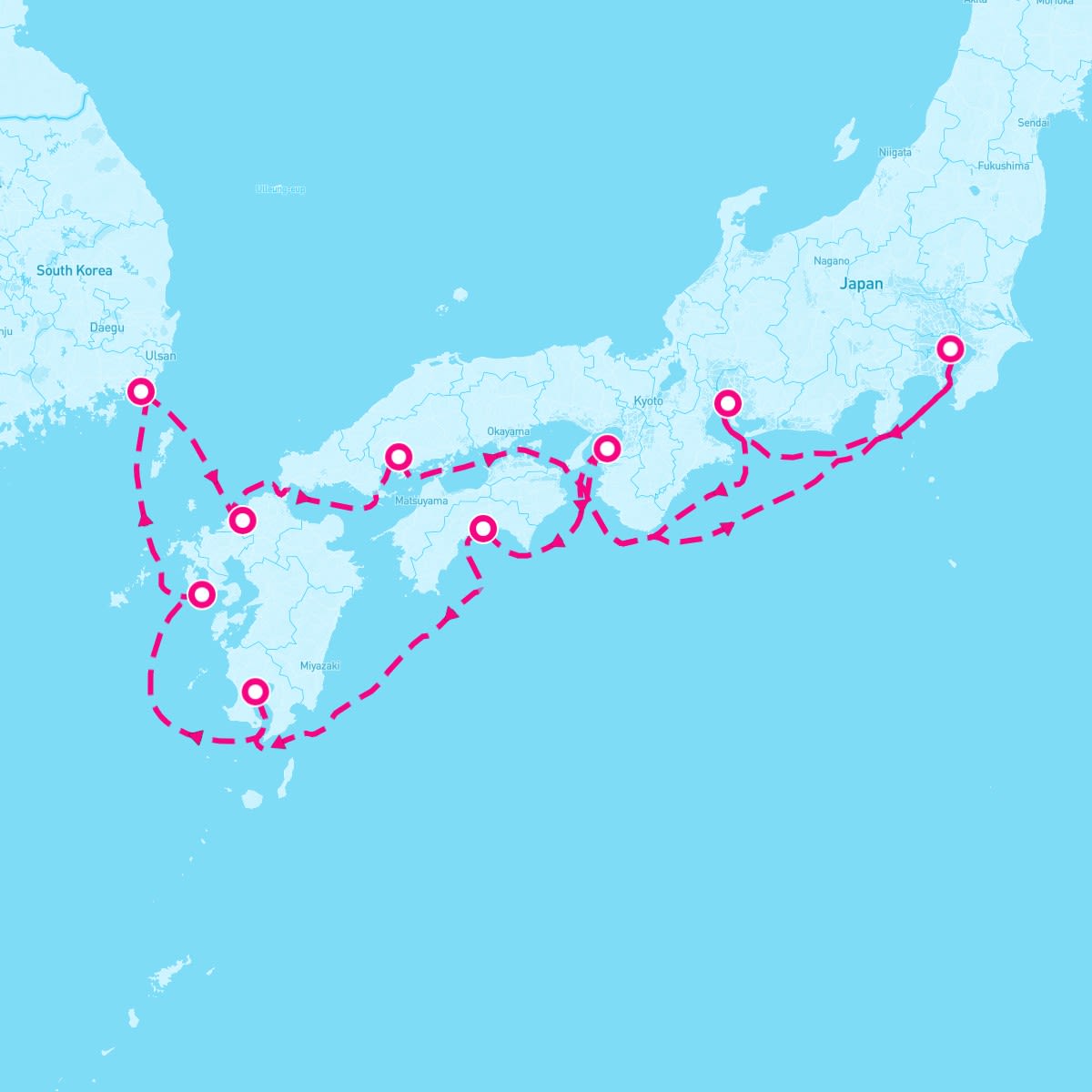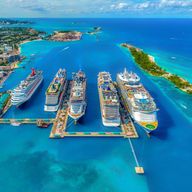

Nautica - 3/11/2027
The March 11, 2027 cruise on the Nautica departs from Tokyo, Japan. On this 10 Night Japanese Dawn (Tokyo Roundtrip) sailing, the ship will visit a total of 9 cruise port destinations, including its departure port. The Nautica sets sail on Thursday, Mar 11th and returns on Sunday, Mar 21st.
Cruise Pricing
The graph below tracks historic price of the Nautica cruise ship departing March 11, 2027. The most recent price for this sailing starts at $3,720 ($372 per night) for an Inside Cabin. Compared to the average price of $4,476 ($448 per night), this represents a recent decrease of 17%.
Use the buttons below to toggle between cabin types.
Cruise Itinerary
Itinerary
Nautica - March 11, 2027 - 10 Nights
| Day | Date | Port |
|---|---|---|
| 1 | Mar 11th | Tokyo, Japan |
| 2 | Mar 12th | Nagoya, Japan |
| 3 | Mar 13th | Kyoto Kobe Japan |
| 4 | Mar 14th | Kochi, Japan |
| 5 | Mar 15th | Kagoshima, Japan |
| 6 | Mar 16th | Nagasaki, Japan |
| 7 | Mar 17th | Busan (Pusan), South Korea |
| 8 | Mar 18th | Fukuoka, Japan |
| 9 | Mar 19th | Hiroshima, Japan |
| 10 | Mar 20th | At Sea |
| 11 | Mar 21st | Tokyo, Japan |
The Nautica sails on March 11, 2027 for a 10 Night Japanese Dawn (Tokyo Roundtrip). The ship will depart the port of Tokyo, Japan at 5:00 PM and will return to the port of Tokyo, Japan on Mar 21st at 8:00 AM. During the 11-day journey, the Nautica will visit 8 additional ports and will spend 1 days at sea.
Itinerary Safety Score
Based on my comprehensive research of cruise port safety information, including recent crime reports, travel advisories, Global Peace Index rankings, and specific port security concerns, we've created a "safety score" for each cruise port stop. The overall rating below represents a combined score for your specific cruise itinerary.
Cruise Ship

Nautica
Oceania Cruise Line
The Nautica was built in 2000 and is among Oceania's 6 ships in its fleet. The Nautica is included in the cruise line's Regatta class. In the cruise ship stats below, you'll find the Nautica vs all other Oceania ships.
Cruise Ports
Tolanaro (Fort Dauphin), Madagascar, offers docking at Tolanaro Port. Travelers explore Nahampoana Reserve and Libanona Beach. Excursions include lemur-watching at Berenty Reserve. Local markets sell zebu curry. The peak season, May to October, brings dry weather for coastal tours. Photography captures rainforests and Indian Ocean vistas. Dining onboard includes romazava, a Malagasy favorite. Souvenirs, like raffia crafts, are sold in ship shops. Briefings cover Tsitongambarika history. Light clothing and sun protection suit the tropical climate, while sturdy shoes enhance reserve walks. Tolanaro’s natural allure offers a vibrant Malagasy stop. Cruise travelers enjoy a mix of unique wildlife and scenic beaches, making Tolanaro an engaging destination for exploration.
Nagoya, Japan, provides docking at Nagoya Port. Travelers explore Nagoya Castle and Atsuta Shrine. Excursions visit Toyota’s factory museum for automotive history. Local markets sell kishimen noodles. The peak season, March to May, brings cherry blossoms and mild weather. Photography captures samurai castles and urban skylines. Dining onboard includes hitsumabushi, a Nagoya eel dish. Souvenirs, like noren curtains, are sold in ship shops. Briefings cover Aichi’s industrial history. Light layers suit the temperate climate, while comfortable shoes enhance castle walks. Nagoya’s blend of history and modernity offers a vibrant Japanese stop. Cruise travelers enjoy a mix of samurai heritage, spiritual sites, and industrial innovation, making Nagoya an engaging destination for exploring Japan’s cultural and technological richness in the Chubu region.
Kyoto, Japan, offers a cruise excursion from Kobe Port. Travelers explore Kinkaku-ji and Fushimi Inari Shrine. Excursions visit Arashiyama Bamboo Grove. Local markets sell kaiseki. The peak season, March to May, brings mild weather for city tours. Photography captures golden pavilions and torii gates. Dining onboard includes sushi, a Japanese favorite. Souvenirs, like kimono crafts, are sold in ship shops. Briefings cover Heian history. Light clothing and sun protection suit the temperate climate, while comfortable shoes enhance shrine walks. Kyoto’s cultural charm offers a vibrant Japanese stop. Cruise travelers enjoy a mix of historic temples and scenic groves, making Kyoto an engaging destination.
Kochi, Japan, has docking at Kochi Port. Travelers explore Kochi Castle’s samurai history. Excursions visit Katsurahama Beach and Ryugado Cave. Local markets sell bonito flakes. The peak season, March to May, brings mild weather. Photography captures castle views and Pacific shores. Dining onboard includes katsuo tataki, a local seared tuna. Souvenirs, like yosakoi crafts, are sold in ship shops. Briefings cover Shikoku’s history. Light layers suit the temperate climate. Comfortable shoes enhance castle tours. Kochi’s coastal heritage offers a serene Japanese stop, blending samurai history with scenic beauty.
Kagoshima, Japan, has docking at Kagoshima Port. Travelers explore Sakurajima volcano’s active trails. Excursions visit Sengan-en Garden’s historic grounds. Local markets sell shochu. The peak season, March to May, brings cherry blossoms. Photography captures volcanic landscapes and coastal vistas. Dining onboard includes kurobuta pork, a Kagoshima specialty. Souvenirs, like ceramic crafts, are sold in ship shops. Briefings cover Kyushu’s history. Light layers suit the temperate climate. Sturdy shoes enhance volcano hikes. Kagoshima’s volcanic beauty offers a dynamic Japanese stop, blending nature with cultural heritage.
Nagasaki, Japan, offers docking at Nagasaki Port. Travelers explore the Peace Park and Atomic Bomb Museum. Excursions visit Glover Garden’s colonial mansions. Local markets sell champon noodles. The peak season, March to May, brings cherry blossoms and mild weather. Photography captures historic sites and Dejima Island views. Dining onboard includes sara udon, a Nagasaki dish. Souvenirs, like castella cakes, are sold in ship shops. Briefings cover Nagasaki’s WWII history. Light layers suit the temperate climate, while comfortable shoes enhance park walks. Nagasaki’s blend of history and resilience offers a poignant Japanese stop. Cruise travelers enjoy a mix of somber memorials, colonial heritage, and scenic harbors, making Nagasaki an engaging destination for exploring Japan’s cultural and historical depth on Kyushu Island.
Busan, South Korea, in the southeast, sits on the Korea Strait, facing the Sea of Japan. The port is near Jagalchi Fish Market, where fresh seafood is sold daily. Haeundae Beach offers urban waterfront access, while Beomeosa Temple, in the forested hills, provides cultural history. The Gamcheon Culture Village, with colorful houses, draws visitors for its art and narrow alleys. Busan’s port history as a trading hub is evident in its maritime museum. The nearby Nakdong River Estuary is a birdwatching site, and the city’s coastal cliffs offer walking trails with ocean views.
Fukuoka, Japan, offers docking at Hakata Port. Travelers explore Dazaifu Tenmangu Shrine’s historic gardens. Excursions visit Canal City’s vibrant shopping complex. Local markets sell hakata ramen. The peak season, March to May, brings cherry blossoms and mild weather. Photography captures shrine architecture and modern cityscapes. Dining onboard includes tonkotsu ramen, a local specialty. Souvenirs, like furoshiki cloths, are available in ship shops. Briefings cover Kyushu’s history. Light layers suit the temperate climate. Comfortable shoes enhance shrine visits. Fukuoka’s blend of ancient shrines and modern vibrancy provides a dynamic Japanese stop, immersing travelers in its rich cultural heritage and lively urban energy.
Hiroshima, Japan, has docking at Hiroshima Port. Travelers explore Peace Memorial Park and Atomic Bomb Dome. Excursions visit Miyajima’s floating Itsukushima Shrine. Local markets sell okonomiyaki. The peak season, March to May, brings cherry blossoms. Photography captures historic sites and island shrines. Dining onboard includes Hiroshima-style okonomiyaki. Souvenirs, like peace cranes, are sold in ship shops. Briefings cover WWII history. Light layers suit the temperate climate. Comfortable shoes enhance park walks. Hiroshima’s poignant history offers a profound Japanese stop, blending peace advocacy with cultural heritage.
Take advantage of the many on board activites during your day at sea. You'll have more than enough to fill your day!
Tolanaro (Fort Dauphin), Madagascar, offers docking at Tolanaro Port. Travelers explore Nahampoana Reserve and Libanona Beach. Excursions include lemur-watching at Berenty Reserve. Local markets sell zebu curry. The peak season, May to October, brings dry weather for coastal tours. Photography captures rainforests and Indian Ocean vistas. Dining onboard includes romazava, a Malagasy favorite. Souvenirs, like raffia crafts, are sold in ship shops. Briefings cover Tsitongambarika history. Light clothing and sun protection suit the tropical climate, while sturdy shoes enhance reserve walks. Tolanaro’s natural allure offers a vibrant Malagasy stop. Cruise travelers enjoy a mix of unique wildlife and scenic beaches, making Tolanaro an engaging destination for exploration.